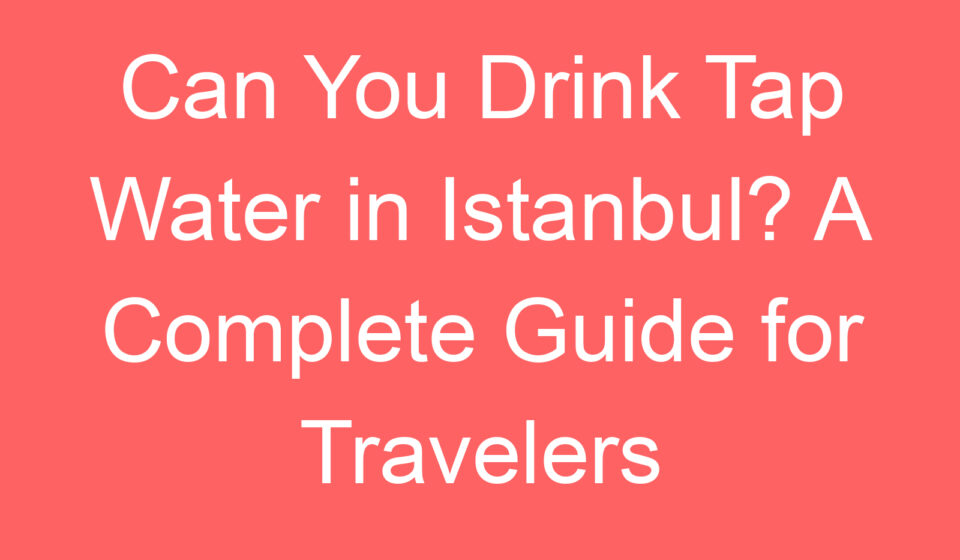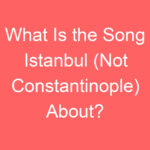
Can You Drink Tap Water in Istanbul? A Complete Guide for Travelers
Visiting Istanbul means immersing yourself in centuries of history, stunning architecture, and vibrant culture. From wandering through the Grand Bazaar to cruising the Bosphorus, every detail of your trip matters. But one practical question almost every traveler asks is: can you drink the tap water in Istanbul? The official answer is yes, but with important caveats. Below, you’ll find an expanded, in‑depth guide that covers safety, quality, comparisons, and practical advice for every visitor.
Table Of Content
💧 Is Istanbul’s Tap Water Safe?
The city’s water supply is managed by İSKİ (Istanbul Water and Sewerage Administration), which is responsible for delivering clean drinking water to over 15 million residents. According to İSKİ’s official data:
- 🏭 Water is treated, filtered, and disinfected in modern treatment plants before it enters the distribution system.
- 📊 Daily sampling occurs at 150–200 points across the city, ensuring constant monitoring.
- 📅 Monthly “Su Kalite Raporları” (Water Quality Reports) confirm compliance with both Turkish and EU drinking water standards.
- 🔬 Critical parameters such as pH, chlorine concentration, turbidity, heavy metals, and microbiological safety are checked on a continuous basis.
- 🧪 Even advanced parameters like radiological safety and microplastics levels are periodically monitored, with results generally showing compliance.
On paper, Istanbul’s tap water fully meets international safety standards, which makes it technically drinkable. However, reality on the ground can vary.
⚠️ Why Tourists Should Be Cautious
Even though the treated water is safe when it leaves the treatment plants, several factors can influence what actually comes out of the tap in hotels or apartments:
- 🏚 Aging infrastructure: Many central tourist areas, such as Sultanahmet, Eminönü, and Galata, are filled with older buildings. Their corroded pipes or outdated storage tanks can introduce rust, sediment, or bacteria.
- 👃 Taste and odor issues: To keep the water safe, İSKİ adds chlorine, which often leaves a strong chemical taste or smell. Locals usually tolerate it, but travelers may find it unpleasant.
- 🌫 Uneven distribution quality: While water may be clear in one district, in another it could appear cloudy or even slightly colored due to internal building plumbing.
- 🤢 Traveler sensitivity: Visitors unaccustomed to Istanbul’s water composition may experience mild stomach upset even if the water is technically safe.
- 🧴 Storage tanks: In some older apartments, water may sit in rooftop tanks for long periods, where temperature and exposure can affect quality.
For these reasons, most residents and virtually all visitors prefer bottled or filtered water for direct drinking.
✅ What’s Safe to Do with Tap Water
Even if you avoid drinking it straight from the faucet, Istanbul’s tap water is perfectly fine for many everyday uses:
- 🪥 Brushing your teeth: Locals and visitors alike do this without issues.
- 🍲 Cooking and boiling: Heating or boiling eliminates possible bacteria and neutralizes chlorine.
- 🥗 Washing fruits and vegetables: Generally safe, though some health‑conscious travelers prefer rinsing with bottled water as a precaution.
- 🚿 Showers, handwashing, and cleaning: No restrictions at all — completely safe.
- 🧼 Laundry and dishwashing: Safe and effective; detergents and soap neutralize potential microorganisms.
🚫 What’s Best to Avoid
- 🚱 Drinking directly from the tap: While technically possible, it’s not recommended due to taste, infrastructure, and variability in building quality.
- ❌ Assuming uniform safety: Water quality differs from building to building. New hotels may have modern plumbing, while historic guesthouses might not.
- 🧴 Filling travel bottles directly: Unless you know the pipes are modern and the water is filtered, stick to bottled refills.
- 🏨 Ignoring hotel advice: If staff recommend against drinking from the tap, follow their guidance — they know their own building’s conditions.
🏨 What Hotels and Travelers Report
Traveler experiences provide valuable insights:
- 🏨 Guests in some Sultanahmet hotels have reported yellowish or reddish tap water, likely from old pipes, making it visually unappealing.
- 💬 On TripAdvisor forums, visitors often agree: “It’s technically safe, but the taste isn’t good.”
- 🌐 Reddit users frequently note that locals almost never drink tap water, choosing bottled water instead.
- 🧴 Despite official assurances, a large majority of Istanbul residents rely on bottled water for everyday hydration.
- ⭐ Some modern hotels advertise in‑room water filtration systems as an added amenity, providing reassurance to international guests.
🌍 Practical Tips for Visitors
If you’re planning a trip to Istanbul, here are steps to make sure your stay is comfortable and safe:
- 🍼 Buy bottled water: Widely available and inexpensive. A large 1.5‑liter bottle costs less than a metro ride.
- 🏠 Check your accommodation: Many modern hotels and Airbnbs install their own filters or provide complimentary purified water.
- 🌱 Pack a portable filter: Ideal for long stays or eco‑friendly travelers who want to reduce plastic waste.
- 🏚 Use caution with older buildings: If water looks cloudy or discolored, don’t drink it.
- 🔎 Check guest reviews: Travelers often comment on tap water quality in their hotel reviews.
- 🌡 Stay hydrated: Istanbul can be hot, especially in summer. Always have bottled water with you during sightseeing.
- 💧 Use refill stations: Some cafés, co‑working spaces, and modern gyms provide filtered water refills, a good eco‑friendly option.
🧭 Comparing With Other Destinations
- 🇫🇷 Western Europe: In cities like Paris or Berlin, tap water is clean and drinkable everywhere, and most locals rely on it daily.
- 🇹🇷 Other parts of Turkey: In smaller towns and rural areas, water safety is less reliable than in Istanbul, with more reliance on bottled water.
- 🇬🇷 Neighboring countries: Greece and Bulgaria also advise bottled water in certain regions, similar to Istanbul’s situation.
- 🇺🇸 United States: Tap water safety varies widely depending on state and city, with some areas comparable to Europe, others more like Istanbul.
- 🌏 Asia: In many Southeast Asian countries, tap water is not safe for drinking at all, so Istanbul represents a middle ground.
Understanding these comparisons helps set realistic expectations — Istanbul is safer than many destinations, but not at the level of Northern or Western Europe.
🧾 Extra Considerations for Long‑Term Stays
For travelers staying in Istanbul for weeks or months, additional practices may help:
- 🛒 Buy large bottled containers: Many grocery stores sell 10–19 liter water bottles with dispensers, common in local households.
- 🔧 Consider installing a small home filter if you’re in an Airbnb or rental.
- 💵 Budget for bottled water: While cheap per bottle, costs add up during longer stays.
- 🧑🤝🧑 Observe locals: If your neighbors or hosts drink tap water, they may have confidence in the plumbing in that building.
📝 Final Word
Tap water in Istanbul is officially safe by international standards. However, due to chlorine taste, old infrastructure, and variations across neighborhoods, it’s best not to drink it straight from the tap. Instead:
- 🪥 Use it confidently for hygiene, brushing teeth, and cooking.
- 🧴 Opt for bottled or filtered water for hydration, following the lead of locals.
- 🌱 If you want to travel sustainably, bring a portable filter or rely on refill stations when available.
This balanced approach ensures you stay healthy and enjoy your trip without worry.
✨ Travel tip: In restaurants and cafés, bottled water is the norm. Always specify if you want still or sparkling water, and don’t hesitate to ask your hotel if they provide filtered water for guests. For eco‑conscious travelers, carrying a reusable bottle and a compact filter can be a smart compromise between safety and sustainability.

